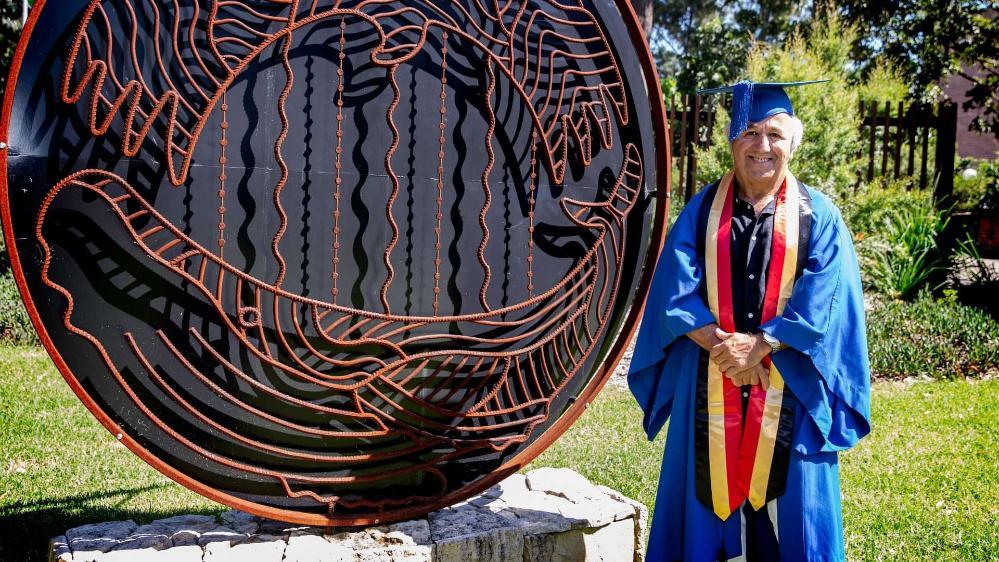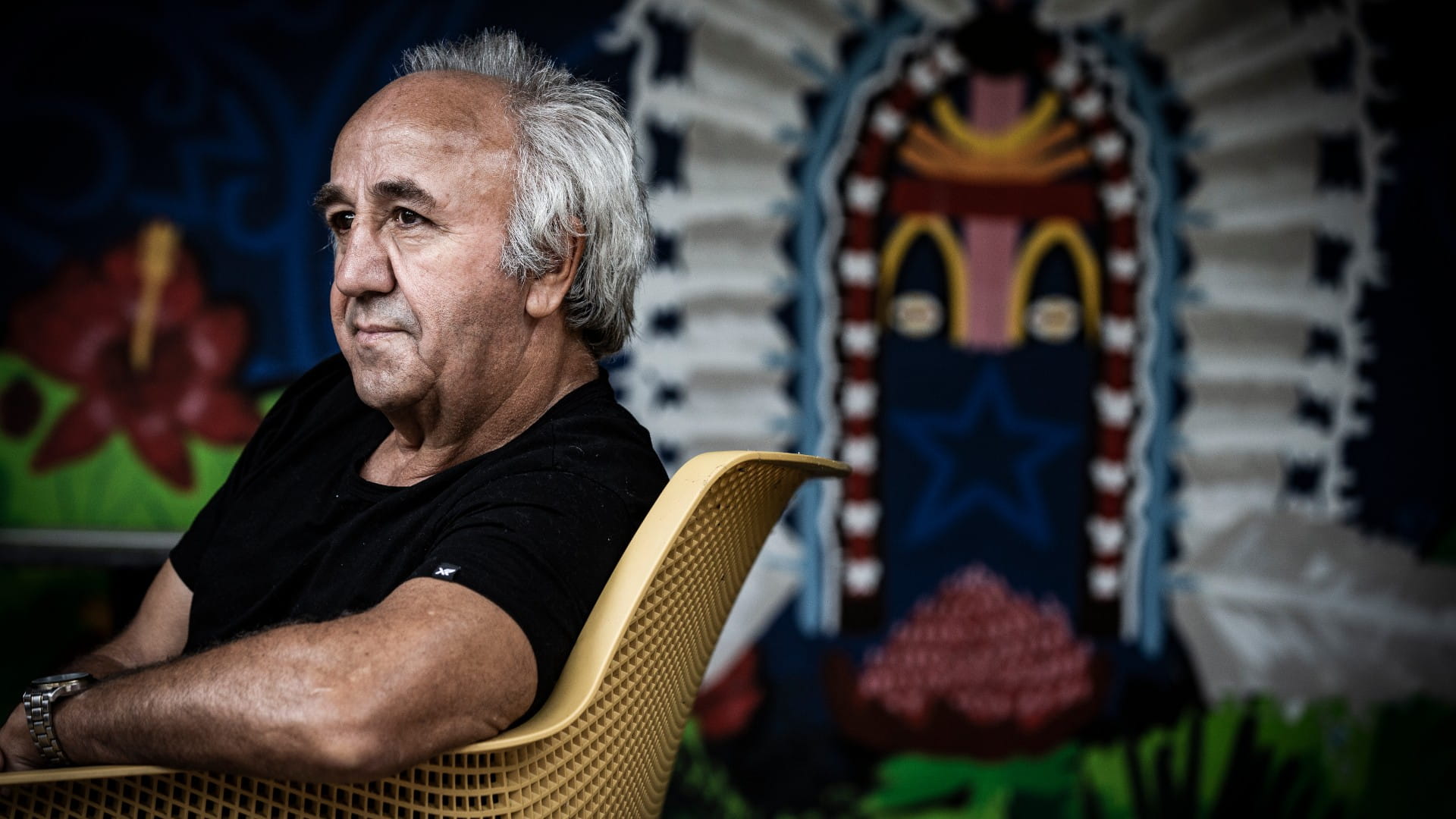March 8, 2021
A graduate in his 60s, Keith says it’s never too late to start studying
Indigenous graduate focusing on future in social activism
It is never too late to learn or to try something new.
That is the message Keith Brandy is keen to convey, as he celebrates his graduation from the University of Wollongong with his first, but hopefully not last degree. All while in his 60s.
Keith, who has graduated with a Bachelor of Arts, majoring in Indigenous Studies and History, returned to study five years ago, decades after completing his Higher School Certificate at TAFE.
It was something Keith, a proud Wiradjuri man, had always wanted to do, but as he built a life in Canberra, had a family, and worked across public service in a range of roles, there was never a right time.
“I moved to Wollongong for personal reasons and when things didn’t work out, I decided to stay on,” said Keith. “I reached a point where I had an opportunity and do something different.
“About 25 years ago, I went back to TAFE and did my Year 11 and 12 in one year. I wanted to study at ANU [in Canberra] but I wasn’t accepted into the course. But here I was, all those years later, and I had the opportunity.”
Keith was not necessarily looking for a career change. He didn’t want to become an “engineer or an accountant,” but instead wanted to gain a foundational understanding of the arts and explore his two favourite subjects, Indigenous studies and history.
“I wanted a good, all-round base,” he says. “I found the degree really interesting and I loved the learning side of it. But going in to a classroom when I’d just turned 60, and it was full of young, savvy kids, that was pretty daunting. I thought, the only way I can compete is to read, read, read. So, I did.
“The more I learnt, the more confident I felt in engaging in conversation with the other students.”
Keith had grown up in tough circumstances. Raised in Condobolin, in the Central West of New South Wales, Keith’s father was not around and his mother passed away when he was aged seven.
“My grandmother raised myself and my three siblings on her Aged Pension. She supported us on three pounds a week, which is the equivalent today of about $14 a fortnight. My grandmother didn’t understand government forms and missed out on getting extra funding, which she was entitled to, to care for us. The conditions were not conducive to me learning in high school,” Keith said. “Life was tough but we had lots of love to get us through.
“She was an exceptional woman, my grandmother. I represented my country in school boy rugby league, and there were many times when she scraped together enough money for me to catch the bus and have lunch. She always made sure I had that.
“There were days when I hitchhiked from Condobolin to wherever we were playing, so just I didn’t miss out on my sport.”

His grandmother passed away when Keith was 16. He left school to help support the family, and one of his jobs was working in a menswear store. Rugby league was his real dream, and he was good, but it was stymied by a knee injury at the age of 20.
So, Keith began working in the public service, often as a voice on Indigenous issues. Keith has worked across corrective services, sport and recreation, Indigenous affairs, and community services.
Throughout it all there was a healthy competition with his siblings, with his brother and sister also holding degrees. It gave Keith the extra motivation he needed to pursue, and finish, his own studies.
The feat, of three of four siblings completing undergraduate degrees despite an incredibly difficult start in life, is not lost on Keith.
“I am proud as punch of my siblings. I’m prouder of them than I am of myself. We often rib each other about it.
“Women have been the strong role models in my life. My sisters, my grandmother, my ex-wife, they have played a huge role in helping me to get to where I am today. My ex-wife was my biggest mentor. She has four degrees, and she spured me on the finish my degree.”
Keith said that at times, it was hard to see the finish line of his studies. He spent five years attaining the degree, in large part because he took on an internship with the Sydney-based engineering company Arup, as part of the Indigenous Career Trackers initiative.
As the oldest participant in the program, Keith was skeptical at first as to what he could gain from the experience. But it was, he said, a “tremendous” experience and one of the highlights of his degree.
“I knocked the Career Trackers back about three times, but I ended up signing up. Taking part in a three-day course, with 1500 other Indigenous students across the country, was incredible.
“I began working for ARUP as part of it. I worked for them full time over summer, then they asked if I wanted to work a few days a week. I wanted to finish my degree, but I really loved working for ARUP, so I did a few days with them and went to uni three days a week. It took me four and a half years in the end.”
Throughout it all, Keith was grateful to draw on the support and expertise of Woolyungah Indigenous Centre. It enabled him to meet other Indigenous students and discover opportunities that he never would have known about.
“Every university campus in Australia should have a centre like Woolyungah,” he said. “I’ve received so much support and help along the way. Through Woolyungah, I’ve gotten involved in a couple of committees on campus, representing Indigenous and mature-aged students.”
At times, studying has involved a great deal of sacrifice for Keith. Yet, every missed birthday or funeral, even occasion when he has had to hit the books rather than spend time with his loved ones, has been worth it.
Now that he is out the other side, Keith said he would not hesitate to add to his tertiary education. But, for the moment, he is focusing on his work and his social activism, serving as a mentor for young Indigenous men, particularly in the field of men’s health.
He is also a public speaker, working with the Speakers Institute, and hopes to build on this in the future.
“I want to involve myself even more in the community, in education and Indigenous affairs. I want to be a role model for Indigenous men, and help with health issues, or to access an education,” Keith said.
“You are never too old to study. The reality is, even if you think it’s too late, you can cut it. You can do it. You’re never too old to try something new or learn more. Your ability is only limited by your imagination.”
